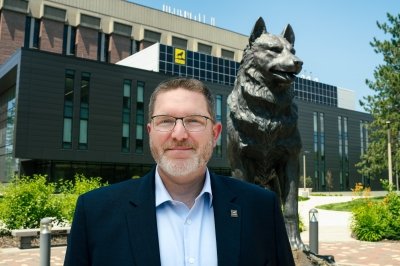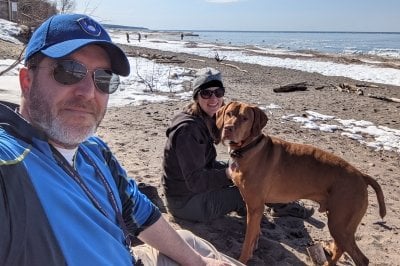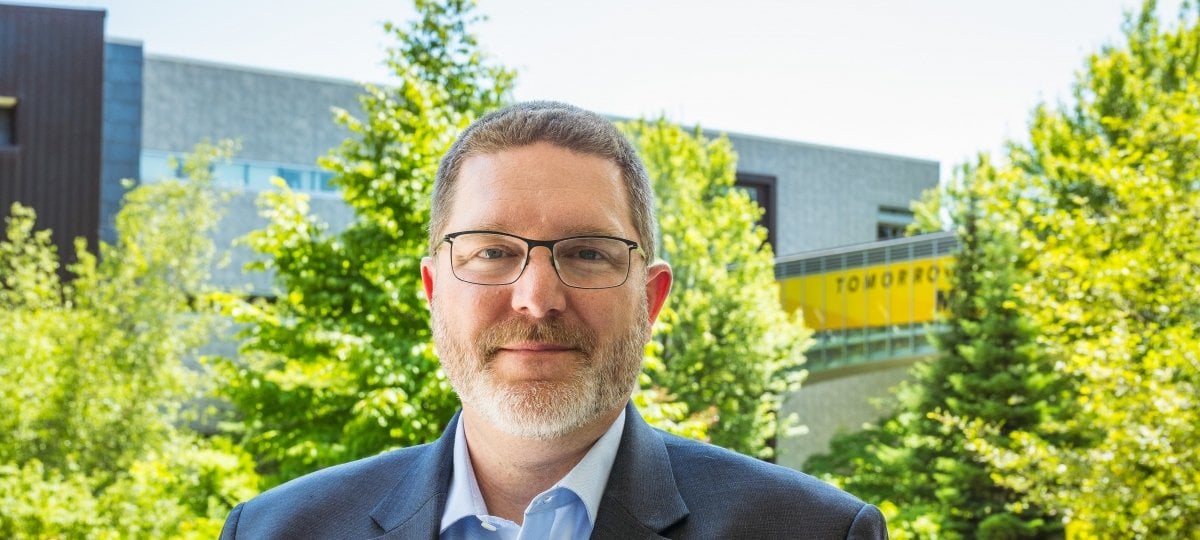Michigan Technological University's new vice president for research shares his vision for the University's research efforts.
Andrew Barnard's tenure as Michigan Technological University's new vice president for research began on July 1, opening the next chapter of his history at the University. After earning his bachelor's and master's degrees in mechanical engineering from Michigan Tech, Barnard '02 '04 completed a PhD in acoustics from Penn State in 2010. In 2014, he returned to Tech, becoming an associate professor of mechanical engineering-engineering mechanics and advising the Strategic Education through Naval Systems Experiences Enterprise team, or SENSE. In 2019, Barnard received the University's Distinguished Teaching Award and became director of the Great Lakes Research Center. Now, after a two-year stint as director of Penn State's graduate program in acoustics, and as Michigan Tech celebrates two major research milestones, Barnard takes the helm of Tech's research efforts.

Q: What are your primary areas of research? What topics are you currently focusing
on?
AB: My primary area of interest is acoustics and noise control engineering. I'm interested
in making mechanical systems quiet — everything from hard drives to submarines and
aircraft. I'm also interested in using soundscapes to inform decision-making, from
natural soundscapes in national parks to underwater soundscapes in the Great Lakes
to under-ice soundscapes in the Arctic and Antarctic. This work involves data science,
machine learning and artificial intelligence to understand large data sets of sound
recordings.
Q: How does your own research inform your approach as Michigan Tech's new vice president
for research?
AB: Acoustics is, by its nature, interdisciplinary. My own background lies at the
intersection of mechanical engineering, physics and fine arts. Acoustics problems
are informed by responses of people to sounds, tying in the social sciences. I strongly
believe in interdisciplinary team science, and I believe acoustics is a good example
of that, although there are many others. I hope to strengthen collaborations across
campus to help solve pressing issues that have deep societal impact.
Q: In 2023, Michigan Tech reported over $100 million in research expenditures for
the first time in University history. What about MTU's research makes it so attractive
to sponsors and funding agencies?
AB: Michigan Tech has world-class researchers and unique, place-based research opportunities.
We have excellent undergraduate and graduate students who use hands-on skills learned
at Michigan Tech to deliver high-impact research outcomes around the world. Our University
also has a unique and special connection to industry, which results in both direct
funding and highly competitive joint proposals.

Q: You most recently were at Penn State, but you're no stranger to the Keweenaw. What's
your favorite part about being back?
AB: It's great to be back on the big lake. I missed the ebbs and flows of Lake Superior:
the calm waters of the summer, the angry waves of the fall, the frozen serenity of
winter. In a way, the lake is a reflection of the people of the Keweenaw, who I also
missed. People here know how to enjoy the seasons, work hard, play hard and support
one another. My favorite part is the "we're all in it together" attitude that exists
here.
Q: Michigan Tech is on track to be formally classified by the Carnegie Classification
as a Research 1 (R1) institution in January 2025. What will R1 status mean for the University?
AB: R1 status is a reflection that we are already doing the right things at Michigan
Tech. Of course, it also comes with prestige and opportunities to compete for larger
awards and partner with larger institutions. I hope R1 status will raise Michigan
Tech's status nationwide and allow us to continue to recruit the best students, faculty
and staff from all over the world.
Q: What do you see ahead for Michigan Tech research in 2030? In 2050?
AB: I see Michigan Tech nearly doubling our research expenditures around 2030. That
will mean a more robust research support operation within the Vice President for Research
Office, as well as larger and more recognized research centers and institutes. Michigan Tech will continue to grow research in our existing areas of excellence
and will rapidly expand our focus on health sciences and engineering. Michigan Tech
is currently a top 200 research institution, based on research expenditures. By 2050,
Michigan Tech should be nearing the top 100, as our areas of excellence are well aligned
with the research needs of the coming decades.
Michigan Technological University is an R1 public research university founded in 1885 in Houghton, and is home to nearly 7,500 students from more than 60 countries around the world. Consistently ranked among the best universities in the country for return on investment, Michigan's flagship technological university offers more than 120 undergraduate and graduate degree programs in science and technology, engineering, computing, forestry, business, health professions, humanities, mathematics, social sciences, and the arts. The rural campus is situated just miles from Lake Superior in Michigan's Upper Peninsula, offering year-round opportunities for outdoor adventure.






Comments